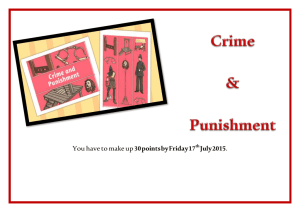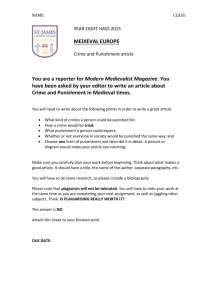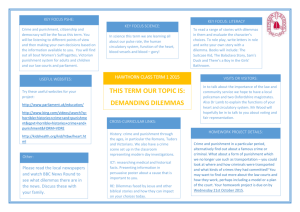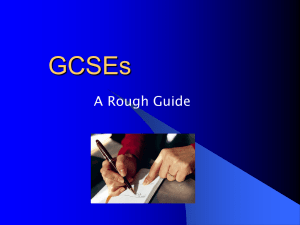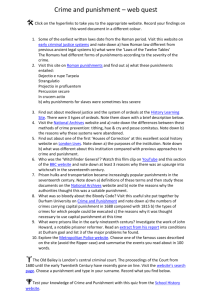the Year 10 here - All Saints Catholic School
advertisement
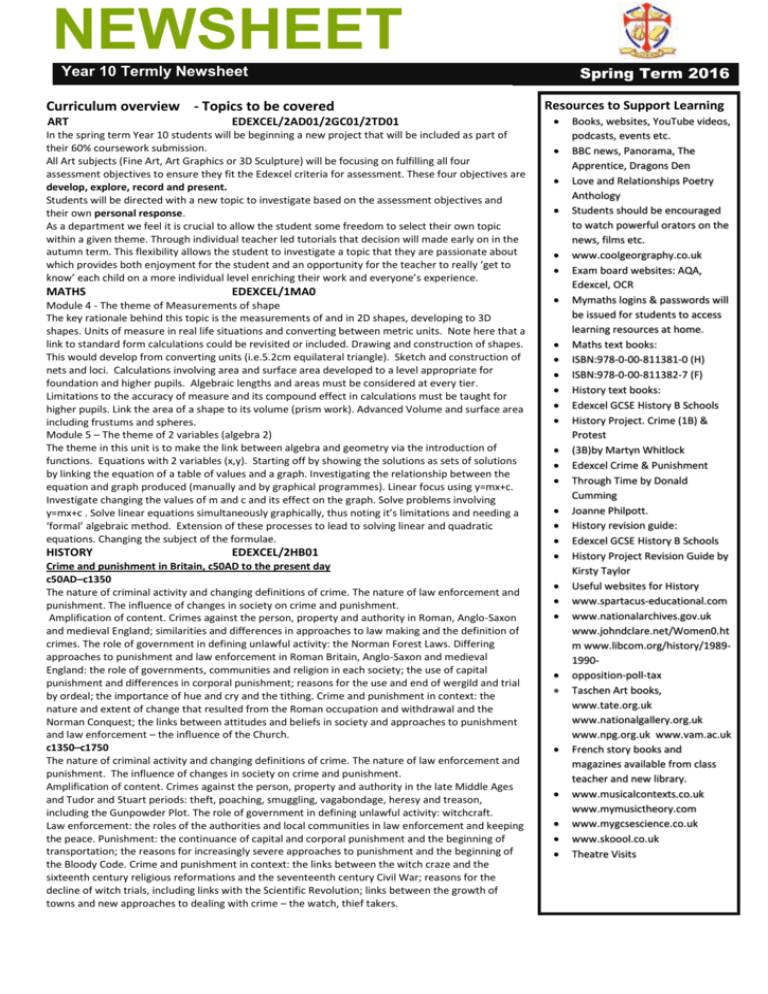
NEWSHEET Spring Term 2016 Year 10 Termly Newsheet Curriculum overview - Topics to be covered ART EDEXCEL/2AD01/2GC01/2TD01 In the spring term Year 10 students will be beginning a new project that will be included as part of their 60% coursework submission. All Art subjects (Fine Art, Art Graphics or 3D Sculpture) will be focusing on fulfilling all four assessment objectives to ensure they fit the Edexcel criteria for assessment. These four objectives are develop, explore, record and present. Students will be directed with a new topic to investigate based on the assessment objectives and their own personal response. As a department we feel it is crucial to allow the student some freedom to select their own topic within a given theme. Through individual teacher led tutorials that decision will made early on in the autumn term. This flexibility allows the student to investigate a topic that they are passionate about which provides both enjoyment for the student and an opportunity for the teacher to really ‘get to know’ each child on a more individual level enriching their work and everyone’s experience. MATHS EDEXCEL/1MA0 Module 4 - The theme of Measurements of shape The key rationale behind this topic is the measurements of and in 2D shapes, developing to 3D shapes. Units of measure in real life situations and converting between metric units. Note here that a link to standard form calculations could be revisited or included. Drawing and construction of shapes. This would develop from converting units (i.e.5.2cm equilateral triangle). Sketch and construction of nets and loci. Calculations involving area and surface area developed to a level appropriate for foundation and higher pupils. Algebraic lengths and areas must be considered at every tier. Limitations to the accuracy of measure and its compound effect in calculations must be taught for higher pupils. Link the area of a shape to its volume (prism work). Advanced Volume and surface area including frustums and spheres. Module 5 – The theme of 2 variables (algebra 2) The theme in this unit is to make the link between algebra and geometry via the introduction of functions. Equations with 2 variables (x,y). Starting off by showing the solutions as sets of solutions by linking the equation of a table of values and a graph. Investigating the relationship between the equation and graph produced (manually and by graphical programmes). Linear focus using y=mx+c. Investigate changing the values of m and c and its effect on the graph. Solve problems involving y=mx+c . Solve linear equations simultaneously graphically, thus noting it’s limitations and needing a ‘formal’ algebraic method. Extension of these processes to lead to solving linear and quadratic equations. Changing the subject of the formulae. HISTORY EDEXCEL/2HB01 Crime and punishment in Britain, c50AD to the present day c50AD–c1350 The nature of criminal activity and changing definitions of crime. The nature of law enforcement and punishment. The influence of changes in society on crime and punishment. Amplification of content. Crimes against the person, property and authority in Roman, Anglo-Saxon and medieval England; similarities and differences in approaches to law making and the definition of crimes. The role of government in defining unlawful activity: the Norman Forest Laws. Differing approaches to punishment and law enforcement in Roman Britain, Anglo-Saxon and medieval England: the role of governments, communities and religion in each society; the use of capital punishment and differences in corporal punishment; reasons for the use and end of wergild and trial by ordeal; the importance of hue and cry and the tithing. Crime and punishment in context: the nature and extent of change that resulted from the Roman occupation and withdrawal and the Norman Conquest; the links between attitudes and beliefs in society and approaches to punishment and law enforcement – the influence of the Church. c1350–c1750 The nature of criminal activity and changing definitions of crime. The nature of law enforcement and punishment. The influence of changes in society on crime and punishment. Amplification of content. Crimes against the person, property and authority in the late Middle Ages and Tudor and Stuart periods: theft, poaching, smuggling, vagabondage, heresy and treason, including the Gunpowder Plot. The role of government in defining unlawful activity: witchcraft. Law enforcement: the roles of the authorities and local communities in law enforcement and keeping the peace. Punishment: the continuance of capital and corporal punishment and the beginning of transportation; the reasons for increasingly severe approaches to punishment and the beginning of the Bloody Code. Crime and punishment in context: the links between the witch craze and the sixteenth century religious reformations and the seventeenth century Civil War; reasons for the decline of witch trials, including links with the Scientific Revolution; links between the growth of towns and new approaches to dealing with crime – the watch, thief takers. Resources to Support Learning Books, websites, YouTube videos, podcasts, events etc. BBC news, Panorama, The Apprentice, Dragons Den Love and Relationships Poetry Anthology Students should be encouraged to watch powerful orators on the news, films etc. www.coolgeorgraphy.co.uk Exam board websites: AQA, Edexcel, OCR Mymaths logins & passwords will be issued for students to access learning resources at home. Maths text books: ISBN:978-0-00-811381-0 (H) ISBN:978-0-00-811382-7 (F) History text books: Edexcel GCSE History B Schools History Project. Crime (1B) & Protest (3B)by Martyn Whitlock Edexcel Crime & Punishment Through Time by Donald Cumming Joanne Philpott. History revision guide: Edexcel GCSE History B Schools History Project Revision Guide by Kirsty Taylor Useful websites for History www.spartacus-educational.com www.nationalarchives.gov.uk www.johndclare.net/Women0.ht m www.libcom.org/history/19891990opposition-poll-tax Taschen Art books, www.tate.org.uk www.nationalgallery.org.uk www.npg.org.uk www.vam.ac.uk French story books and magazines available from class teacher and new library. www.musicalcontexts.co.uk www.mymusictheory.com www.mygcsescience.co.uk www.skoool.co.uk Theatre Visits MUSIC EDEXCEL/2MU01 Western Art Music 1741-1839 - Analysis of set works 1, 2 & 3 with socio-historical context, specimen exam questions and aural perception training. 20th Century Art Music 1909-1987 - Analysis of set works 4, 5, and 6 with socio-historical perception training. Composing Minimal music with techniques of Reitch and Glass. *Composing modal jazz: Composing with the techniques and approaches of (especially) Miles Davis Performance Skills PE (GCSE) AQA/4890 Students will acquire advanced skills in the range of sports covered depending on the strengths of the group will help decide what sports are covered. Students will select and apply these skills in competitive situations. Students will develop as officials and coaches in practical lessons. Year 11 students will complete their part C in the first term. This is where they write a report on their own or someone else’s strengths in a sport of their choice. FRENCH ICT AQA/4655 EDEXCEL Cambridge National Unit 1 – Understanding Computer Systems ENGLISH AQA/4705 Love and Relationships Poems - Students will be guided through an analysis of 8 poems form the Literature Anthology in preparation for their final exam in Yr11. Writer's viewpoints and perspectives - Students will investigate a wide range of rhetorical devices and develop their implementation into their own writing. GEOGRAPHY AQA/9030 Population - Population policies, migration, refugees. Restless Earth - Volcanoes and earthquakes BUSINESS STUDIES EDEXCEL/2BS0 The economic context. Paper 3 (start of traditional year 11 programme). Marketing SCIENCE AQA/4405/4408/4410 Biology 2 – Cells, tissues and organs. Organisms and the environment, Environment, Energy and Physics 2 – Motion, Forces, Work, energy and momentum, electricity, radioactivity, energy from the nucleus respiration, Inheritance, Evolution PE (CORE) Students will acquire skills in the range of sports covered. Sports covered in the winter terms: Rugby, football, netball, handball, table tennis, basketball, gymnastics, dance, swimming and hockey. Students will select and apply these skills in competitive situations TECHNOLOGY AQA/4540/4560/4570 Textiles - Making progress of their GCSE coursework – moving onto their Design ideas Resistant Materials - Making progress of their GCSE coursework – moving onto their Design ideas Product Design - Making progress of their GCSE coursework – moving onto their Design ideas RAISING MONEY FOR CAFOD. Chaplaincy would like to thank all those who took part in the sponsored silence, in order to raise funds for CAfOD World Gifts for people in developing countries. We managed to raise £3,200. As per usual, each form provided a hamper to be given to the Local St. Vincent de Paul conferences in the deanery and neighbouring Parishes and Anchor House. The 6th Form did their bit and arranged a number of activities ranging from Sumo Wrestling; Cake and doughnut selling; penalty shoot outs; film screening and a sweet & sour challenge. They managed to raise between £800-£1000. Due to the untimely death of a student of All Saints, their money is being donated to the Teenage Cancer Trust. DATES FOR THE DIARY Reports Evening Mock Interview Day Work Experience - 04/02/16 08/02/16 22/02/16 – 04/03/16 Try our new French Corner in the new Library. Open every break and lunchtime. Eleven of our French y10 students have attended a conference on How to get an A or A* at the French GCSE on Friday 27th November 2015. This conference gave the opportunity to the students to have a clearer focus and understanding of examination success. It was also a chance for students to experience a fun and interactive French day. This motivational one day course was run by experienced teachers as well as examiners who demonstrated exactly what is required to achieve the highest grades in the four skills in MFL. One of our students, Temi was chosen to read the A* example in front of the two hundred students present. She made the school proud reading with an excellent pronunciation and intonation the difficult text she had been given. Ariel was also selected to show how much he had learned from the conference at the end of the day in a competition against other students. He was among the four winners and received a small prize. All the students greatly enjoyed and benefited from this day. Yr10 Boys played rugby league semi-finals of the London and South England both matches against Verulam. Yr10’s narrowly lost 22-20 in the last few minutes of the game, showing great determination and skill. On Saturday 28th November, 30 students took part in a Duke of Edinburgh Award training event at Hainault Forest Park. The event involved working in groups learning map reading and bearing taking. The event was a great success and although it was a little bit cold, all the students were in good spirits. We have a total of 50 students on the Duke of Edinburgh Award at present so there will be another event at Hainault in the New Year. After that we will be carrying out a day’s walking and map reading in Epping Forest on a weekend in March. This is followed by a weekend overnight camp before the students participate in their final expedition in July. The award involved volunteering, learning a new skill and taking part and improving in a physical activity. Some volunteering is in school and some out of school. On Fridays there are around 10 students who help disabled people swim at the leisure centre. We’ve also got students helping with dance classes and church groups out of school too. The Award is great for All Saints. The students are keen and want to do well. They do a lot of volunteering anyway and this helps recognise that. Employers love the Duke of Edinburgh Award. It has all the skills they look for in people. Teachers involved are Mr Eason, Mr Bonnar, Mr Arrarte, Mrs Lukhman, Mr Siva, Miss Sheehan, Miss Conroy and Mr McCarthy. OTHER INFORMATION If students underperforming against their target grades they will be asked to attend intervention lessons after school to support their learning. Support from parent/carers is encouraged and necessary. Correct equipment is to be brought to every lesson. Calculators are available from school via ParentPay Look up news articles on migration, refugees or natural disasters Any Art materials are welcomed in addition to 2b drawing pencil. As part of the Art course, Students will need to purchase an A3 sketchbook available from ParentPay. Trips to museums and galleries are encouraged to enrich student’s education and cultural experiences. After every Maths assessment students are required to highlight 2 mathematical areas of weakness and produce a corrected response to ensure that their unsecured learning has been addressed. History students will have a homework booklet which will contain a range of exam questions. They will be instructed to answer particular questions but they can answer extra if they wish. Students should be encouraged to research and revise on topics we study. Students are encouraged to buy revision guides and workbooks available for school via ParentPay. Involvement in extracurricular clubs in and outside of school will help develop student’s practical ability. French Reading programme - Independent reading of story books is available to KS4 students. KEY DATES English - Half term assessment (essay) Comparing 2 unseen poems ICT - 18th May 2016 @ 9a.m. External Exam B/Studies-We begin the term with a very difficult topic – the economic environment’. This is often seen as a challenge to the year 10 students. It requires a sound understanding of not only supply and demand, but also the commodity markets, interest and exchange rates finishing up with the business cycle. It would be helpful if during this time parents / guardians discuss the above issues with the students to help them understand the economic environment on a personal level as well as a business level. The second half of the term introduced the traditional year 11 programme of study. This is where the method of assessment changes. Prior to this term students have been assessed on simple multiple choice / short answers. It is now they are required to develop arguments and justifications for business decisions. PE-At the end of each sports students will be giving a GCSE mark. In theory lessons students will be given a test at the end of each unit of work and will achieve a grade. Maths - All students will continue to use their mathematics revision folder. They will be given a skills and knowledge checklist sheet for each theme. Students will be required to form their own revision notes for each theme which must be placed within the revision folder. At the end of each theme, the students will sit a test and be given a % score. Students will then be required to highlight 2 mathematical areas of weakness and produce a corrected response, with detailed commentary, to ensure that this unsecured learning has been addressed. Science - Mock exam in February which will be Physics 2. Mock exam before Easter on Biology 2 History – Museums - Until 10th April 2016, the Museum of London is holding an exhibition of rarely-seen items from the archives of the Metropolitan Police. Although there is a cost to this exhibition, it would be well worth a visit for students of crime. Jack the Ripper guided walk in Whitechapel (date tbc – in January or February) There will be regular assessments in class, through students answering examination questions. An end of unit test, consisting of a past exam paper, will be held just before the Easter holidays.



